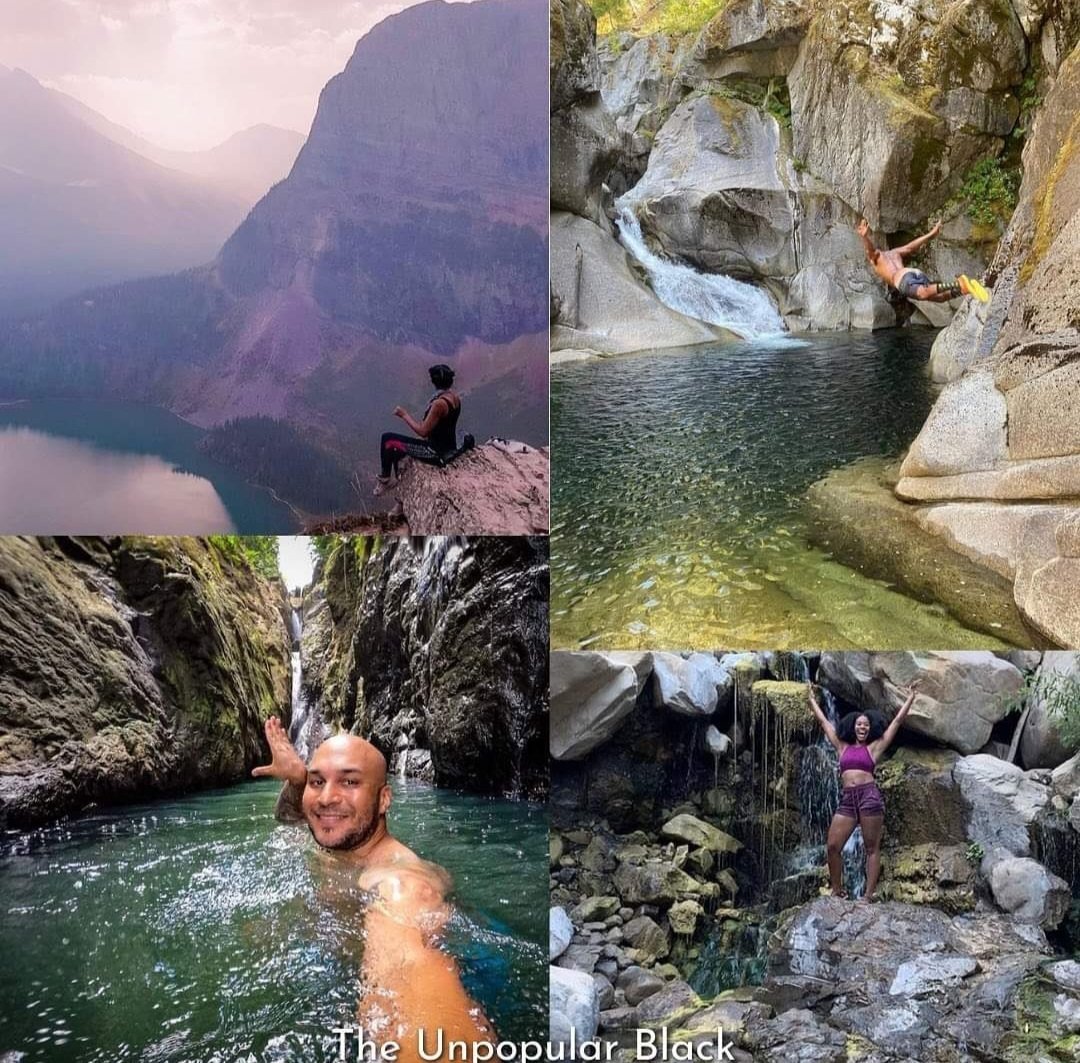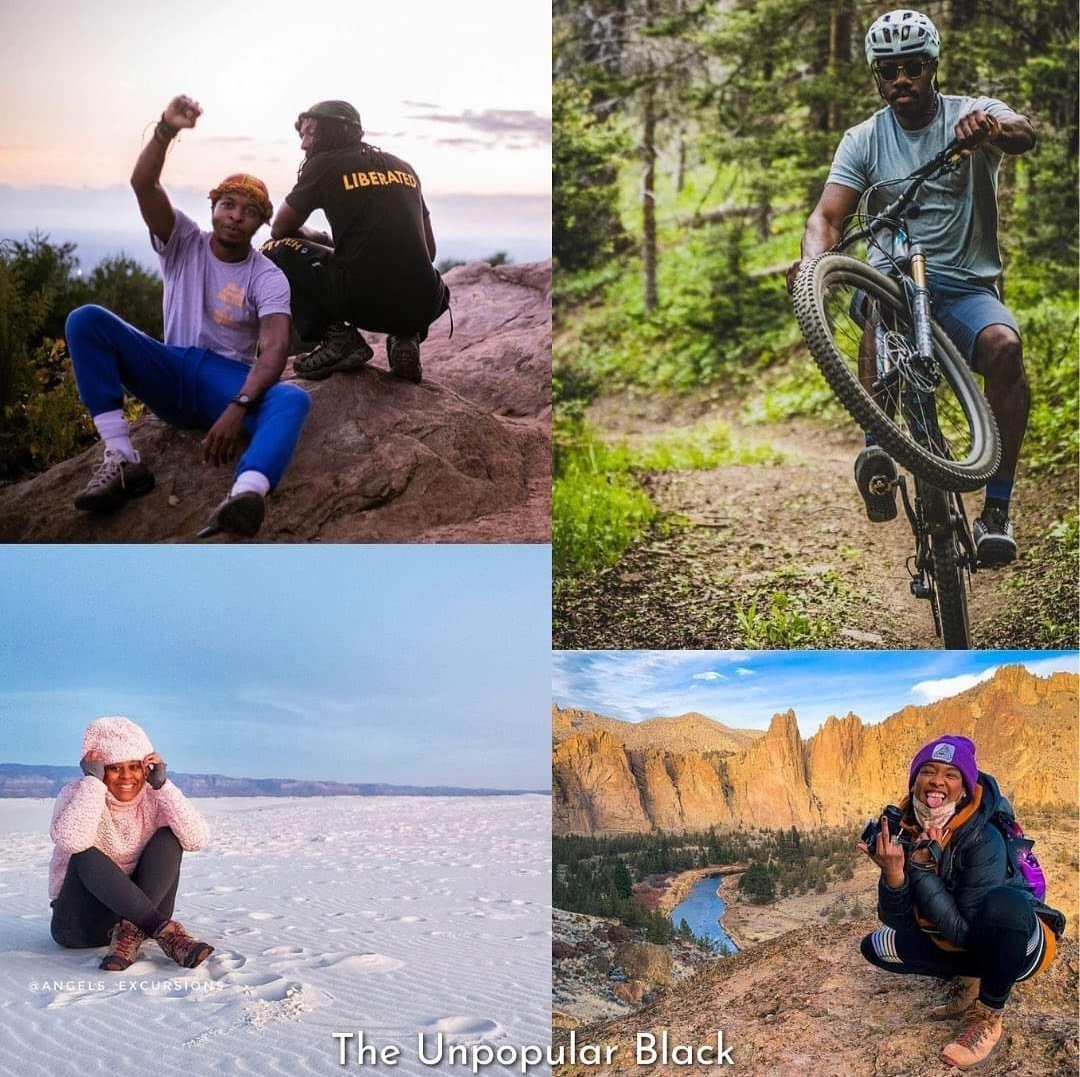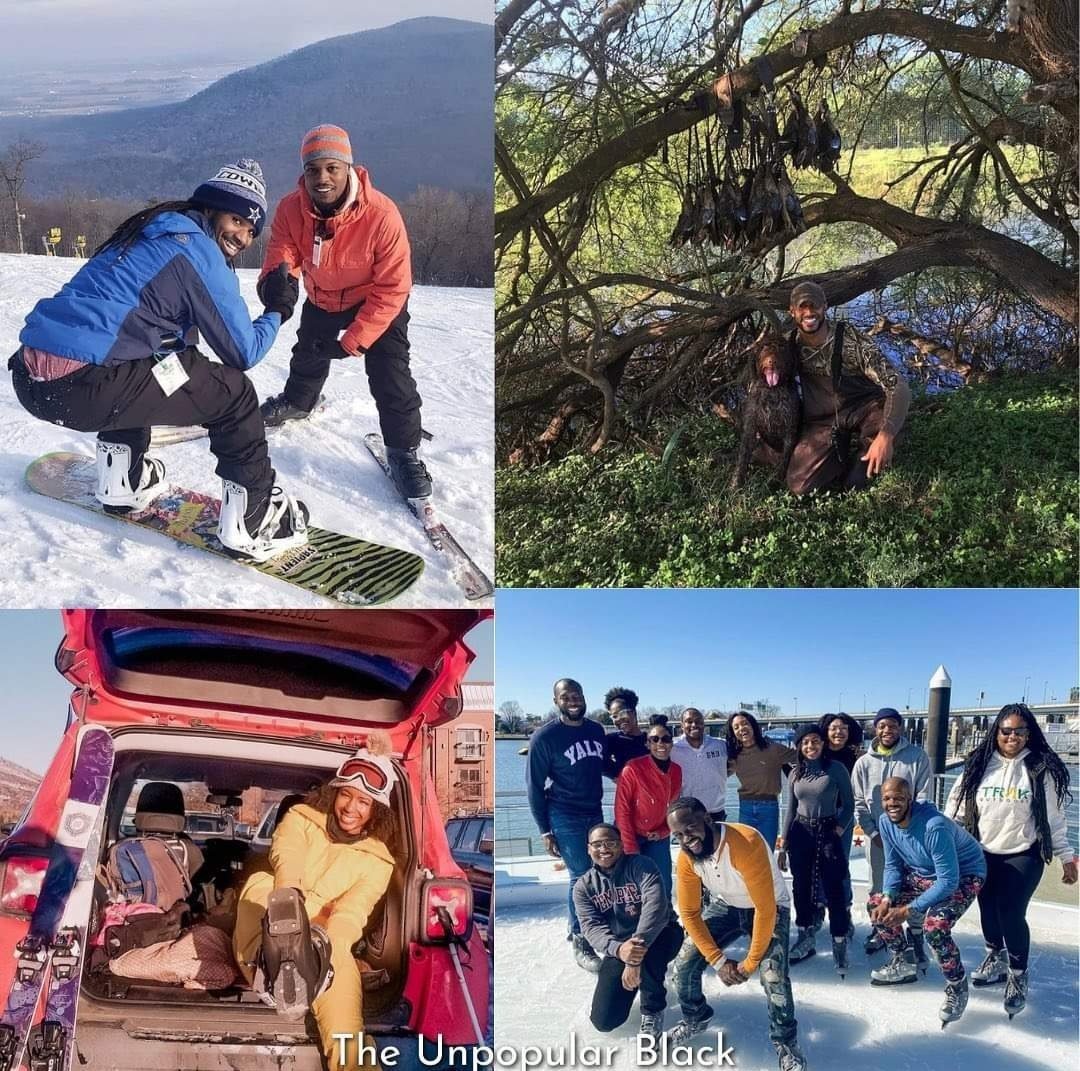Four Black Owned Businesses Bringing Diversity To Nature
Earth Day 2022 was a holiday that brought environmental issues to the forefront of international conversation. Topics centric to water health, air pollution and the ecological imprints left by every human being collectively bind us in the upkeep and sustainability of the Earth we all call home independent of the societal lines or political ties that often divide us. As unifying as this sounds, people of color here in the United States continue to have a very different relationship with ‘the great outdoors’. We are constantly asked to be environmentally conscious, but are the same people often marginalized when it comes to freely experiencing and being represented in this often touted destination that is merely a few hours away by car from where most of us live. The issue is built on a lack of representation in nature and an internal one based on how a portion of us consider what 'is' or 'isn't' a 'black' activity. This space that openly welcomes many to access the unpaved trails, verdant national parks and other beautiful greenspaces associated with an active, healthy and adventurous lifestyle rarely included or were barely marketed to us in print or algorithm. That was true until now. For Earth Day 2022, we sat down and spoke with four black-owned companies that are using their love of seeing others connect with nature up close and redefining what black travel looks like when it ventures off-the-beaten-path that defines access.
Nicole (top) and Shara enjoying the early days of spring exactly where you should be—outside in Virginia. (Photo Credit: Instagram)
Black Girls Hike RVA
“I grew up being outdoors all the time,” Nicole Boyd, Co-Founder of Black Girls Hike RVA, begins describing her experience growing up in the Clinton Hill section of Brooklyn. “As you know, New York City is one of the best cities in the world and it has some great parks like Central Park and Prospect Park. And one of my favorite parts about that was just making our way through the woods. My dad would just say to me and my brother, ‘Come on, let’s go,’ and we would go explore.”
This childhood love of nature sticks with Nicole to this day as an English teacher in Richmond, Virginia and was what made her want to celebrate her birthday with a group hike at Crabtree Falls to step into her new year in stride back in 2018. She and five of her friends–Shara Cade, Co-Founder of Black Girls Hike who is also a Science teacher, being one of them–were having a fun time, but made quick observations of the lack of diversity they were seeing along the trail. The poorly-concealed looks of astonishment at the presence of Nicole and Shara’s group were getting as they scaled the incline one step at a time like everyone else were coming from a few noticeable directions. One of Nicole’s friends along for the birthday festivities was white and soon became the focus of a question asked by a complete stranger.
"'Oh–Is she your tour guide?' That’s what this woman asked us.” Nicole takes a second to lean back while grinning at the poor and common assumption that black people would be in nature unassisted for their own interest. "Yeah, people are bold." Years later in spring 2020, Nicole invited Shara to come with her for a casual walk in the park–one that would eventually lead them to where Black Girls Hike is today.
“Just as the pandemic hit, we started to hike more beginning with the local ones around our neighborhood and I started to really enjoy it,” Shara says of the early days when her interest in hiking started at a time when she admits that the activity was not one of her favorite things to do. She started to notice what Nicole did that day in Crabtree when it came to seeing more color in greenspaces. “We definitely talked about what we saw and wanted to do something about it. When first started the group it wasn’t like we were thinking it would be a business or anything like that. We were just two friends who were going to hang out and go hiking. And then people started liking our pictures on Instagram and telling us what parks to go to next. It quickly became something bigger than us. It started with Nicole trying to change my mind about hiking to becoming something official.”
Founded in May 2020, Black Girls Hike RVA began its community-building trek into some of Virginia’s best trails that welcomed many new travelers to the amazing picturesque views from the high points of a state that is home to blushing vineyards and forest green valleys that endlessly roll and gloriously shades with the seasons. Larus Park, Sharp Top Mountain, Natural Bridge State Park, Forest Hill Park, Pocahontas State Park, Saint Mary’s Wilderness, Mount Pleasant, Twin Lakes State Park and many others have been to this created safe space that moves as the hike does with support and the welcomed moments when nature makes itself heard and seen. Black Girls Hike also has started welcoming teenage groups as a way to bring forth young interested learners or those who are not familiar with the natural majesty of Virginia. This is in line with the educators they both are and a practice Shara uses to give a reminder to her class.
“When Earth Day comes around I don’t make a really big deal because, like I tell my students, ‘Every day is Earth Day’. You should always feel like you’re not leaving a trace.” Shana carries practice to every Black Girls Hike tour. “I do feel like whatever I bring into a natural space is something I should take out with me. We’re always offering members in our groups’ trash bags–I mean–we’ll even carry their trash if they don’t have a bag because what we leave behind could hurt our watershed and other parts of our environment.”
Conservation always takes precedence with Black Girls Hike. It's connected to the very ethos of the mission and a piece of a larger fabric that brings them closer as an organization to its goal.
“We were very intentional when we were creating a space out on the trail for black women to be comfortable,” Michelle says before remembering an instance where she was reminded that black people, in general, were barred from these areas. “On one of our hikes, we had a woman that was just about to turn 70 and she was taking in all the great scenery and how happy she was to be doing this. Then she started opening up to us about how she couldn’t be in green spaces like this when she was a little girl. That one time her father told her where she wanted to go was for ‘whites only’. Next to her was a woman who was in her early twenties standing there listening. When the woman finished talking, the younger woman said, ‘I only hear things like that in history books’. That really put things in perspective. It made me feel good knowing that we’re creating a safe space out here for times like that with what we’re doing.” That moment shows how not too far removed we are from that time in history and the importance of Black Girls Hike RVA. Diversity in greenspaces is proving to be an issue not only germane to the East Coast as another revolution for inclusion is taking shape by the footprint on the West Coast.
Black Girls Trekkin’
Southern California is internationally recognized for its proximity to the endless palm-tree-laden beaches and to the stars of screen and sound. One thing not in reach for the residents of Los Angeles, the region’s cultural centerpiece, is access to parks with hiking trails longer than two miles. This was an acceptable norm for many, but not for Michelle Race and her friend Tiffany. Black Girls Trekkin’ was founded in 2017 and came into existence to help close the overlooked gap people of color have to address before stepping foot into nature.
“As an organization based in a major city that is relatively ‘park poor’ it can be challenging to get to green spaces and the disparities in access are increased for historically underrepresented communities,” Michelle writes, explaining the hurdles present in their mission’s path. “It can be a big learning curve to gain knowledge on where to find trails.” Of the 181 parks in all of Los Angeles County, just over sixty are sizable recreational greenspaces and ten of those have natural trails. Only two of the ten trails are over four miles in length. That makes going to the local high school track to walk a few laps a better option to get some fresh air in a city blanketed by smog created by decades of emissions and chemtrails from tracing flight patterns over already hazy skies. Black Girls Trekkin’ has removed the hassle of searching for other people trying to live the good life outdoors and its group activities offer it’s growing demographic a chance to ‘hike, climb, run and embrace the challenges that the outdoors has to offer’. They even assist in helping to find a campsite and locate the entry points to some sections of the nearby beaches. “Low access plus high barriers to entry only add to the lack of representation of the Black community in natural spaces.”
Photo Credit: Black Girls Trekkin’
The 'barriers' seen and unseen that Michelle states are many. Traveling distance, finances and comfort while enjoying the trails are just three of them. Black Girls Trekkin’ is making the trail more inviting for women of color to finally be seen as a part of the global outdoor community. This is proving to be a greater ally in changing the scope of thinking that excludes them and communities within our larger community from walking and exploring some of our country’s most cherished natural landscapes. One look at the organization's Instagram page shows you all the previous and upcoming excursions that define its vision and create a prominent face in black travel. Last year’s trip to the heights of Sitton Peak near the Inland Empire’s Lake Elsinore, trek out to Cottonwood Camp where the Serrano and West Shoshone people once lived and the group's scaling of the snow-covered climb of Mount Wilson frame just some of the natural extremes Black Girls Trekkin’ has taken its guests. Its most recent get-togethers include visits to Jones Peak near the Sierra Madre, Crystal Cove State Park and is getting ready for its overnight event of the Black Queer Campout in Sequoia State Park coming this June. Each trip represents the ‘diversity’ and ‘inclusion’ the organization promotes, but its efforts in ‘conservation’ and ‘education’ come from the journeys themselves.
“Part of the mission of Black Girls Trekkin’ is to inspire others to learn about the natural world and to protect it,” Michelle writes. “As outdoor enthusiasts, we have the privilege of experiencing the profound impact of being immersed in nature. Earth Day for us is a reminder that the Earth provides us with endless possibilities for adventure and so it's our responsibility to take care of it.” Though Black Girls Trekkin’ was started primarily for women of color, its core message of respectfully taking care of the Earth we all inhabit reaches all of its trekkers. “The door is always open for people to join our events but one of our goals is to empower them to feel more confident creating their own adventures. Giving people tools they can use to incorporate in their everyday lives is what will get more people outdoors. With our group events, our organization takes the guesswork out of discovering a new outdoor space and offers the comfort of a supportive community to explore with in the future.”
Urban Events Global
Urban Events Global is reimagining the parameters of black travel with its annual Urban Camp Weekend that takes place in Texas every June. Kevin Knight, the company’s Founder and CEO, developed these annual gatherings for black people who want to 'relax, network, make new friends or just mingle with other like-minded professionals’. Kevin’s inspiration for this unique experience started back in his youth spent on the US Army base in Frankfurt, Germany where his mother was stationed before moving the family to Louisiana, Texas and then South Carolina before she retired after her 22 years of service. This created a love of travel that Kevin started independently during his college days in Austin at the University of Texas to Egypt, Italy and France represent the number of places that are stamped into all three of his old passports and seen in his new photos on his current travels to international locations. The lessons accrued and the insights gained by taking each encounter with people in lands with cultural differences from his own made Kevin appreciative of working with others. That practice was tested when his company first started organizing the Urban Camp Weekend in 2011. The invisible wall of denied access to certain public camping grounds gave Kevin a first-hand education in how people of color create discomfort and confusion for onlookers when entering public greenspaces.
“The experience happens more behind the scenes when I’m communicating with owners of these camping grounds,” Kevin says as his voice echoes off the cabin of his car en route to the racing track and RV park that he and his investment company own in Kilgore, Texas–a couple of hours east of Dallas. “They have a tough time envisioning it. When they started seeing that we were a cool group, but then they started raising the price on us year after year. By the time it was done, they wanted double the price for the exact same weekend. Once I started to see that it was getting unfair, we bought the 55 acres of land we’re using now."
Creating his own space to develop these experiences for people of color on acres of greens and under endless moonlit skies with no light pollution concealing the stars. A major flex for Urban Events Global after it took the time to carefully search and locate the perfect ground to host events. The Kilgore location also represents the game-changing aspect of ownership that now negates any chance of Urban Events Global having to do business with entities all too reluctant to welcome him and his thousands of guests ready to their campgrounds. People from 38 states have driven or flown to be a part of the Urban Camp Weekend's family fun, happy hour, game night and other activities that turn strangers into 'distant cousins' when it’s time to go home. Attendance ranges from 400 to over 2,000 per weekend. There are over 40,000 members in the company’s Facebook group where previous events are remembered through words, pictures and videos that keep this expanding community tight. Though social media has aided Kevin’s cause in giving another marketable face to black travel and black mobility, his mission still appears to be atypical of the vision many of us see ourselves when it comes to spacious outdoor locations where all of the attractions are natural. Kevin’s direct form of representation when it comes to seeing us living an outdoor life has proven to be the best method of helping other people of color break away from the limiting notions of where our place is believed to be outdoors.
"Some people, even some of my friends, are still surprised when they see all the pictures from our events," Kevin says laughing in amazement. "'Black people are really out here camping?' That’s what they ask me and I just say, ‘Yeah, we are’." Thankfully, this shock isn't a trend with customers. “On our side, we really don’t have to talk people into joining us or anything. By the time they call us, they’re already interested. They were either looking for us online or they’re a friend of a friend and that’s how we started growing organically–word of mouth.” His retelling of how the Urban Camp Weekend became a success then turns more into a tone that returns back to how impactful representation continues to be. "Once you see people who look like you out camping, you start to feel more comfortable about it yourself. The same thing goes with skiing, snowboarding, skydiving or whatever that person feels. If it’s in you, it's in you. I honestly think that as a people there's more of us who are willing to go to do these activities–they just didn't have anyone to do them with."
Kevin's belief that there is strength in numbers is one shared by many. It parallels his stance on the importance of having the conversations Earth Day forces us to have and how we can all make a greater effort to preserve what we have now for those who will follow in our footsteps.
"I have a three-year-old daughter. So I have a vested interest in this world being around long enough for her to enjoy it the same I did. People my age will be fine, but it'll be her generation that has to deal with all the pollution that we've put out into the world so we have to do our part even more.
Urban Camp Weekend, through the years; Photo Credit: Urban Events Gloabl
Courtney Lanctot, CEO and Founder of The Unpopular Black, on hourse back taking in the scene on one of her company’s many tours.
The Unpopular Black
The very face of environmental advocacy has been typecast more as Greta Thurnberg and nothing remotely close to Vanessa Nakate. Though both equally do great work in raising awareness of the corrective harm being done to our planet, this ties into the belief that white people are the only ones with a genuine desire to progressively interact with the environment. This links to marketing as well. Historically, outdoor companies have generally targeted their advertising campaigns towards that base of consumers identically to the way urban apparel and bottled spirits are positioned towards us wrapped in whatever the latest trend is at the time. This melds into the often subscribed false portrayal that most people of color believe as factual when it comes to our connection with tall trees, deep rivers and terrain not meant for a developer's blueprints.
Courtney Lanctot, CEO and Founder of the outdoor travel company The Unpopular Black, encountered this thinking in 2018 when she was trying to welcome a good friend of hers for an outdoor tour. Courtney was just two years into camping after first enjoying Colorado’s San Juan Mountains herself before extending the invitation. Before Courtney could even get her friend to hear the trip she had planned for them, she heard a statement that made her shake her head. 'Black folks don't do that.' Courtney rhetorically asked herself why this was the case not only with her friend, but across a large section of us when it comes to recreational activities outdoors in natural settings. It was something that she personally had to internally denounce herself even though she was raised on the green and icy plains of Alaska as she often refrained from doing the same outdoor activities that as an adult she was starting to love. The only conclusion soon became more apparent as the number of answerless questions grew. She needed to be a part of the change she wanted to see occur.
The Unpopular Black has been the catalyst for offering the much-needed and undervalued sense of representation that impacts people of color since its opening. Located in Denver, this company is broadening the horizons of the new landscape of black travel towards the adventurous and calming escapes of America. Courtney's mission has led a number of personalized tours for chill sessions in Idaho's hot springs, to explore the pathways and waterfalls of New Mexico, to swim and kayak through the expanse of the desert and petrified forests of Arizona and Utah–and a tour of her home state of Alaska for Aurora Borealis with increasing numbers of guests by the trip. The mesmerizing tours of the Rocky Mountains and Pacific Northwest she has shown to her groups of seasoned nature seekers and brand new excursionists are changing the minds of those who once saw themselves where they only thought they 'belonged'.
"Due to Jim Crow, redlining and segregation, these spaces have legally kept these spaces almost exclusively white," Courtney writes, explaining our generational lack of access to green spaces. "My work is to lead by example and educate along the way of how the Black community can experience the American outdoors and fall in love with nature the way I have." She is leading by that example as she continues to do all the ‘outdoorsy things’ she rarely took part in during her youth. Her personal travels to the many breathtaking scapes she's led tours--though indelible–gave her a firsthand introduction to practices by others that demean the lands she loves. “Honestly, the disparities I've witnessed deep in nature is that the people who have had access, do not treat it with care and respect. I've walked upon campgrounds and natural hot springs riddled with trash, used diapers, used bullets and more."
Courtney is a true appreciator of nature by educating her guests on the basic forms of pollution we exhibit with nonchalance. This is why Earth Day is, like the previous individuals mentioned throughout this article, extra special for Courtney.
“Earth Day, to me, is a day of love and deep gratitude in praise of this nurturing space that provides us our home. I usually treat it as a holiday to immerse myself in nature to simply be in communion with it."
The word ‘communion’ by definition means 'the sharing or exchanging of intimate thoughts and feelings, especially when the exchange is on a mental or spiritual level'. Linking this to our growing need for an emotional and nonmaterial recharge in the outdoors is tantamount to our overall well-being. Listening to the origins of these four companies and organizations is proof positive that a life spent outdoors is a life well lived–the very definition of Earth Day and a growing pattern for this new generation of black travel.








